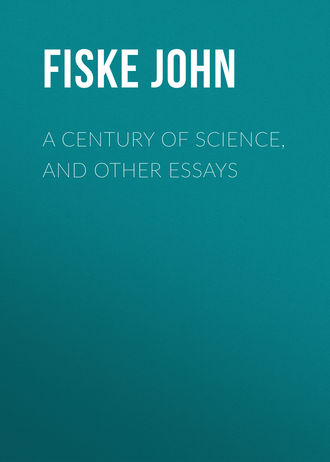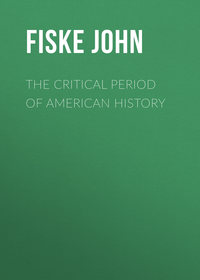 полная версия
полная версияA Century of Science, and Other Essays
The conditions under which Mr. Youmans worked made it necessary for him to consider every point with the extreme deliberation involved in framing distinct mental images of things and processes which he could not watch with the eye. It was hard discipline, but he doubtless profited from it. Nature had endowed him with an unusually clear head, but this enforced method must have made it still clearer. One of the most notable qualities of his mind was the absolute luminousness with which he saw things and the relations among things. It was this quality that made him so successful as an expounder of scientific truths. In the course of his pondering over chemical facts which he was obliged to take at second hand, it occurred to him that most of the pupils in common schools who studied chemistry were practically no better off. It was easy enough for schools to buy textbooks, but difficult for them to provide laboratories and apparatus; and it was much easier withal to find teachers who could ask questions out of a book than those who could use apparatus if provided. It was customary, therefore, to learn chemistry by rote; or, in other words, pupils' heads were crammed with unintelligible statements about things with queer names, – such as manganese or tellurium, – which they had never seen, and would not know if they were to see them. It occurred to Mr. Youmans that if visible processes could not be brought before pupils, at any rate the fundamental conceptions of chemistry might be made clear by means of diagrams. He began devising diagrams in different colours, to illustrate the diversity in the atomic weights of the principal elements, and the composition of the more familiar compounds. At length, by uniting his diagrams, he obtained a comprehensive chart exhibiting the outlines of the whole scheme of chemical combination according to the binary or dualist theory then in vogue. This chart, when published, was a great success. It not only facilitated the acquirement of clear ideas, but it was suggestive of new ideas. It proved very popular, and kept the field until the binary theory was overthrown by the modern doctrine of substitution, which does not lend itself so readily to graphic treatment.
The success of the chemical chart led to the writing of a textbook of chemistry. This laborious work was completed in 1851, when Mr. Youmans was thirty years old. Professor Silliman was then regarded as one of our foremost authorities in chemistry, but it was at once remarked of the new book that it showed quite as thorough a mastery of the whole subject of chemical combination as Silliman's. It was a textbook of a kind far less common then than now. There was nothing dry about it. The subject was presented with beautiful clearness, in a most attractive style. There was a firm grasp of the philosophical principles underlying chemical phenomena, and the meaning and functions of the science were set forth in such a way as to charm the student and make him wish for more. The book had an immediate and signal success; in after years it was twice rewritten by the author, to accommodate it to the rapid advances made by the science, and it is still one of our best textbooks of chemistry. It has had a sale of about one hundred and fifty thousand copies.
The publication of this book at once established its author's reputation as a scientific writer, and in another way it marked an era in his life. The long, distressing period of darkness now came to an end. Sight was so far recovered in one eye that it became possible to go about freely, to read, to recognize friends, to travel, and make much of life. I am told that his face had acquired an expression characteristic of the blind, but that expression was afterward completely lost. When I knew him it would never have occurred to me that his sight was imperfect, except perhaps as regards length of range.
Youmans' career as a scientific lecturer now began. His first lecture was the beginning of a series on the relations of organic life to the atmosphere. It was illustrated with chemical apparatus, and was given in a private room in New York to an audience which filled the room. Probably no lecturer ever faced his first audience without some trepidation, and Youmans had not the mainstay and refuge afforded by a manuscript, for his sight was never good enough to make such an aid available for his lectures. At first the right words were slow in finding their way to those ready lips, and his friends were beginning to grow anxious, when all at once a happy accident broke the spell. He was remarking upon the characteristic inertness of nitrogen, and pointing to a jar of that gas on the table before him, when some fidgety movement of his knocked the jar off the table. He improved the occasion with one of his quaint bons mots, and, as there is nothing that greases the wheels of life like a laugh, the lecture went on to a successful close.
This was the beginning of a busy career of seventeen years of lecturing, ending in 1868; and I believe it is safe to say that few things were done in all those years of more vital and lasting benefit to the American people than this broadcast sowing of the seeds of scientific thought in the lectures of Edward Youmans. They came just at the time when the world was ripe for the doctrine of evolution, when all the wondrous significance of the trend of scientific discovery since Newton's time was beginning to burst upon men's minds. The work of Lyell in geology, followed at length in 1859 by the Darwinian theory; the doctrine of the correlation of forces and the consequent unity of nature; the extension and reformation of chemical theory; the simultaneous advance made in sociological inquiry, and in the conception of the true aims and proper methods of education, – all this made the period a most fruitful one for the peculiar work of such a teacher as Youmans. The intellectual atmosphere was charged with conceptions of evolution. Youmans had arrived at such conceptions in the course of his study of the separate lines of scientific speculation which were now about to be summed up and organized by Herbert Spencer into that system of philosophy which marks the highest point to which the progressive intelligence of mankind has yet attained. In the field of scientific generalization upon this great scale, Youmans was not an originator; but his broadly sympathetic and luminous mind moved on a plane so near to that of the originators that he seized at once upon the grand scheme of thought as it was developed, made it his own, and brought to its interpretation and diffusion such a happy combination of qualities as one seldom meets with. The ordinary popularizer of great and novel truths is a man who comprehends them but partially, and illustrates them in a lame and fragmentary way. But it was the peculiarity of Youmans that while on the one hand he could grasp the newest scientific thought so surely and firmly that he seemed to have entered into the innermost mind of its author, on the other hand he could speak to the general public in an extremely convincing and stimulating way. This was the secret of his power, and there can be no question that his influence in educating the American people to receive the doctrine of evolution was great and widespread.
The years when Youmans was travelling and lecturing were the years when the old lyceum system of popular lectures was still in its vigour. The kind of life led by the energetic lecturer in those days was not that of a Sybarite, as may be seen from a passage in one of his letters: "I lectured in Sandusky, and had to get up at five o'clock to reach Elyria; I had had but very little sleep. To get from Elyria to Pittsburg I must take the five o'clock morning train, and the hotel darky said he would try to waken me. I knew what that meant, and so did not get a single wink of sleep that night. Rode all day to Pittsburg, and had to lecture in the great Academy of Music over footlights… The train that left for Zanesville departed at two in the morning. I had been assured a hundred times (for I asked everybody I met) that I could get a sleeping-car to Zanesville, and when I was all ready to start I was informed that this morning there was no sleeping-car. By the time I reached here I was pretty completely used up."
Such a fatiguing life, however, has its compensations. It brings the lecturer into friendly contact with the brightest minds among his fellow countrymen in many and many places, and enlarges his sphere of influence in a way that is not easy to estimate. Clearly, an earnest lecturer, of commanding intelligence and charming manner, with a great subject to teach, must have an opportunity for sowing seeds that will presently ripen in a change of opinion or sentiment, in an altered way of looking at things on the part of whole communities. No lecturer has ever had a better opportunity of this sort than Edward Youmans, and none ever made a better use of his opportunity. His gifts as a talker were of the highest order. The commonest and plainest story, as told by Edward Youmans, had all the breathless interest of the most thrilling romance. Absolutely unconscious of himself, simple, straightforward, and vehement, wrapped up in his subject, the very embodiment of faith and enthusiasm, of heartiness and good cheer, it was delightful to hear him. And when we join with all this his unfailing common sense, his broad and kindly view of men and things, and the delicious humour that kept flashing out in quaint, pithy phrases such as no other man would have thought of, and such as are the despair of any one trying to remember and quote them, we can seem to imagine what a power he must have been with his lectures.
When such a man goes about for seventeen years, teaching scientific truths for which the world is ripe, we may be sure that his work is great, albeit we have no standard whereby we can exactly measure it. In hundreds of little towns with queer names did this strong personality appear and make its way and leave its effects in the shape of new thoughts, new questions, and enlarged hospitality of mind, among the inhabitants. The results of all this are surely visible to-day. In no part of the English world has Herbert Spencer's philosophy met with such a general and cordial reception as in the United States. This may no doubt be largely explained by a reference to general causes; but as it is almost always necessary, along with our general causes, to take into the account some personal influence, so it is in this case. It is safe to say that among the agencies which during the past fifty years have so remarkably broadened the mind of the American people, very few have been more potent than the gentle and subtle but pervasive work done by Edward Youmans with his lectures, and to this has been largely due the hospitable reception of Herbert Spencer's ideas.
It was in 1856 that Youmans fell in with a review of "Spencer's Principles of Psychology," by Dr. Morell, in "The Medico-Chirurgical Review." This paper impressed him so deeply that he at once sent to London for a copy of the book, which had been published in the preceding year. It will be observed that this was four years before the Darwinian theory was announced in the first edition of the "Origin of Species."15
After struggling for a while with the weighty problems of this book, Youmans saw that the theory expounded in it was a long stride in the direction of a general theory of evolution. His interest in this subject received a new and fresh stimulus. He read "Social Statics," and began to recognize Spencer's hand in the anonymous articles in the quarterlies in which he was then announcing and illustrating various portions or segments of his newly discovered law of evolution. One evening in February, 1860, as Youmans was calling at a friend's house in Brooklyn, the Rev. Samuel Johnson, of Salem, handed him the famous prospectus of the great series of philosophical works which Spencer proposed to issue by subscription. Mr. Johnson had obtained this from Edward Silsbee, who was one of the very first Americans to become interested in Spencer. The very next day Youmans wrote a letter to Spencer, offering his aid in procuring American subscriptions and otherwise facilitating the enterprise by every means in his power. With this letter and Spencer's cordial reply began the lifelong friendship between the two men. It was in that same month that I first became aware of Spencer's existence, through a single paragraph quoted from him by Lewes, and in that paragraph there was immense fascination. I had been steeping myself in the literature of modern philosophy, starting with Bacon and Descartes, and was then studying Comte's "Philosophie Positive," which interested me as suggesting that the special doctrines of the several sciences might be organized into a general body of doctrine of universal significance. Comte's work was crude and often wildly absurd, but there was much in it that was very suggestive. In May, 1860, in the Old Corner Bookstore in Boston, I fell upon a copy of that same prospectus of Spencer's works, and read it with exulting delight; for clearly there was to be such an organization of scientific doctrine as the world was waiting for. It appeared that there was some talk of Ticknor & Fields undertaking to conduct the series in case subscriptions enough should be received. Spencer preferred to have his works appear in Boston; but when in the course of 1860 his book on "Education" was offered to Ticknor & Fields, they declined to publish it, – which was, of course, a grave mistake from the business point of view. Youmans, however, was not sorry for this, for it gave him the opportunity to place Spencer's books where he could do most to forward their success.
Some years before, during his blindness, his sister had led him one day into the store of Messrs. D. Appleton & Co. in quest of a book, and Mr. William Appleton had become warmly interested in him. I believe the firm now look back to this chance visit as one of the most auspicious events in their annals. Youmans became by degrees a kind of adviser as regarded matters of publication, and it was largely through his far-sighted advice that the Appletons entered upon the publication of such books as those of Buckle, Darwin, Huxley, Tyndall, Haeckel, and others of like character; always paying a royalty to the authors, the same as to American authors, in spite of the absence of an international copyright law. As publishers of books of this sort the Appletons have come to be preëminent. It is obvious enough nowadays that such books are profitable from a business point of view; but thirty years and more ago this was by no means obvious. We Americans were terribly provincial. Reprints of English books and translations from French and German were sadly behind the times. In the Connecticut town where I lived, people would begin to wake up to the existence of some great European book or system of thought after it had been before the world anywhere from a dozen to fifty years. In those days, therefore, it required some boldness to undertake the reprinting of new scientific books; and none have recognized more freely than the Appletons the importance of the part played by Youmans in this matter. His work as adviser to a great publishing house and his work as lecturer reinforced each other, and thus his capacity for usefulness was much increased.
When Spencer's book on "Education" failed to find favour in Boston the Appletons took it, and thus presently secured the management of the philosophical series. This brought Youmans into permanent relations with Spencer and his work. In 1861 Youmans was married, and in the course of the following year made a journey in Europe with his wife. It was now that he became personally acquainted with Spencer, and found him quite as interesting and admirable as his books. Friendships were also begun with Huxley and other foremost men of science. From more than one of these men I have heard the warmest expressions of personal affection for Youmans, and of keen appreciation of the aid that they have obtained in innumerable ways from his intelligent and enthusiastic sympathy. But no one else got so large a measure of this support as Spencer. As fast as his books were republished Youmans wrote reviews of them, and by no means in the usual perfunctory way; his reviews and notices were turned out by the score, and scattered about in the magazines and newspapers where they would do the most good. Whenever he found another writer who could be pressed into the service, he would give him Spencer's books, kindle him with a spark from his own magnificent enthusiasm, and set him to writing for the press. The most indefatigable vender of wares was never more ruthlessly persistent in advertising for lucre's sake than Edward Youmans in preaching in a spirit of the purest disinterestedness the gospel of evolution. As long as he lived, Spencer had upon this side of the Atlantic an alter ego ever on the alert with vision like that of a hawk for the slightest chance to promote his interests and those of his system of thought.
Among the allies thus enlisted at that early time were Mr. George Ripley and the Rev. Henry Ward Beecher, both of whom did good service, in their different ways, in awakening public interest in the doctrine of evolution. In those days of the Civil War it was especially hard to keep up the list of subscribers in an abstruse philosophical publication of apparently interminable length. Youmans now and then found it needful to make a journey in the interests of the work, and it was on one of these occasions, in November, 1863, that I made his acquaintance. I had already published, in 1861, an article in one of the quarterly reviews, in which Spencer's work was referred to; and another in 1863, in which the law of evolution was illustrated in connection with certain problems of the science of language. The articles were anonymous, as was then the fashion, and Youmans' curiosity was aroused. There were so few people then who had any conception of what Spencer's work meant that they could have been counted on one's fingers. At that time I knew of only three: the late Professor Gurney, of Harvard; Mr. George Litch Roberts, now an eminent patent lawyer in Boston; and Mr. John Spencer Clark, now of the Prang Educational Company. I have since known that there were at least two or three others about Boston, among them my learned friend the Rev. William Rounseville Alger, besides several in other parts of the country. When we sometimes ventured to observe that Spencer's work was as great as Newton's, and that his theory of evolution was going to remodel human thinking upon all subjects whatever, people used to stare at us and take us for idiots. Any one member of such a small community was easy to find; and I have always dated a new era in my life from the Sunday afternoon when Youmans came to my room in Cambridge. It was the beginning of a friendship such as hardly comes but once to a man. At that first meeting I knew nothing of him except that he was the author of a textbook of chemistry which I had found interesting, in spite of its having been crammed down my throat by an old-fashioned memorizing teacher who, I am convinced, never really knew so much as the difference between oxygen and antimony. At first it was a matter of breathless interest to talk with a man who had seen Herbert Spencer. But one of the immediate results of this interview was the beginning of my own correspondence and intimate friendship with Spencer. And from that time forth it always seemed as if, whenever any of the good or lovely things of life came to my lot, somehow or other Edward Youmans was either the cause of it, or at any rate intimately concerned with it. The sphere of his unselfish goodness was so wide and its quality so potent that one could not come into near relations with him without becoming in all manner of unsuspected ways strengthened and enriched.
In the autumn of 1865 we were dismayed by the announcement that Spencer would no longer be able to go on issuing his works. In London they were published at his own expense and risk, and those books which now yield a handsome profit did not then pay the cost of making them. By the summer of 1865 there was a balance of £1100 against Spencer, and his property was too small to admit of his going on and losing at such a rate. As soon as this was known, John Stuart Mill begged to be allowed to assume the entire pecuniary responsibility of continuing the publication; but this, Mr. Spencer, while deeply affected by such noble sympathy, would not hear of. He consented, however, with great reluctance, to the attempt of Huxley and Lubbock, and other friends, to increase artificially the list of subscribers by inducing people to take the work just in order to help support it. But after several months the sudden death of Spencer's father added something to his means of support, and he thereupon withdrew his consent to this arrangement, and determined to go on publishing as before, and bearing the loss.
But as soon as the first evil tidings reached America Youmans made up his mind that $5500 must be forthwith raised by subscription, in order to make good the loss already incurred. It is delightful to remember the vigour with which he took hold of this work. The sum of $7000 was raised and invested in American securities in Spencer's name. If he did not see fit to accept these securities, they would go without an owner. The best of Waltham watches was procured for Spencer by his American friends; a letter, worded with rare delicacy and tact, was written by the late Robert Minturn; and Youmans sailed for England to convey the letter and the watch to Spencer. It was a charming scene on a summer day in an English garden when the great philosopher was apprised of what had been done. It was so skilfully managed that he could not refuse the tribute without seeming churlish. He therefore accepted it, and applied it to extending his researches in descriptive sociology.
Of the many visits which Youmans made to England, now and then extending them to the Continent, one of the most important was in 1871, for the purpose of establishing the International Scientific Series. This was a favourite scheme of Youmans. He realized that popular scientific books, adapted to the general reader, are apt to be written by third-rate men who do not well understand their subject; they are apt to be dry or superficial, or both. No one can write so good a popular book as the master of a subject, if he only has a fair gift of expressing himself and keeps in mind the public for which he is writing. The master knows what to tell and what to omit, and can thus tell much in a short compass and still make it interesting; moreover, he avoids the inaccuracies which are sure to occur in second-hand work. Masters of subjects are apt, however, to be too much occupied with original research to write popular books. It was Youmans' plan to induce the leading men of science in Europe and America to contribute small volumes on their special subjects to a series to be published simultaneously in several countries and languages. Furthermore, by special contract with publishing houses of high reputation, the author was to receive the ordinary royalty on every copy of his book sold in every one of the countries in question; thus anticipating international copyright upon a very wide scale, and giving the author a much more adequate compensation for his labour. To put this scheme into operation was a task of great difficulty, so many conflicting interests had to be considered. Youmans' brilliant success is attested by that noble series of more than fifty volumes, on all sorts of scientific subjects, written by men of real eminence, and published in England, France, Italy, Germany, and Russia, as well as in the United States.
A word is all that can be spared for other parts of our friend's work, which deserve many words, and those carefully considered. His book on "Household Science" is not the usual collection of scrappy comment, recipe, and apothegm, but a valuable scientific treatise on heat, light, air, and food in their relations to every-day life. In his "Correlation of Physical Forces" he brings together the epoch-making essays of the men who have successively established that doctrine, introducing them with an essay of his own, in which its history and its philosophical implications are set forth in a masterly manner. In his book on the "Culture demanded by Modern Life" we have a similar collection of essays with a similar excellent original discussion, showing the need for wider and later training in science, and protesting against the excess of time and energy that is spent in classical education where it is merely the following of an old tradition.







